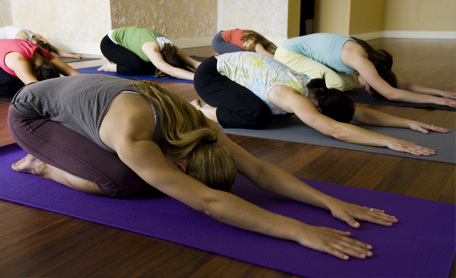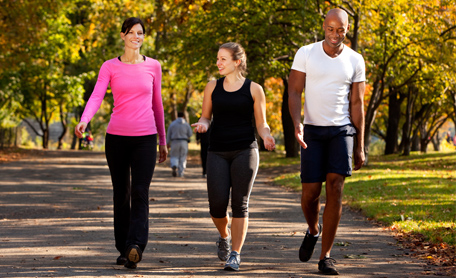Physical activity is good for your body but it's great for your mind too.
Research has shown that exercise releases chemicals in your brain that make you feel good - boosting your self-esteem, helping you concentrate as well as sleep, look and feel better. Not bad for something we can quite easily do for free!
Being active doesn’t have to mean taking out an expensive gym membership, jogging at 5am or sporting lycra. There are so many ways to be active and they can all help to improve your mental health.
Taking part in physical activities can be a great way to meet people. They can also offer us the chance of taking a well-deserved break from the hustle and bustle of daily life.
Leading an active life can help to improve your feelings of self-worth and foster confidence. Taking part in a form of exercise that you really enjoy can give you a goal to aim for and a sense of purpose.
A few benefits of exercise are:
- less tension, stress and mental fatigue
- a natural energy boost
- improved sleep
- a sense of achievement
- focus in life and motivation
- less anger or frustration
- a healthy appetite
- better social life
- having fun
How active do I need to be?
Aim to do 30 minutes of moderate exercise five times a week. It may sound like a lot, but it isn’t as daunting as it first appears. 'Moderate exercise' means being energetic enough that you:
- breathe a little heavier than normal, but aren’t out of breath
- feel warmer, but don’t end up hot and sweaty
You don’t have to jump in a the deep end. Build up slowly, at a pace that suits you. You might like to do 30 minutes per day, or you may prefer two split your time into two 15 minute sessions - it's entirely up to you!

Getting started
- Make time
- Work out what time you have available
- Choose something that fits into your busy schedule
- Alternatively, re-jig commitments to make room for some physical activity
- Be practical
- Will you need support from friends and family?
- Will your active lifestyle have an impact on others in your life?
- Are there any costs involved, if so, what you can do to make it affordable?
- Which activity works for you?
- Is there a particular part of your body you want to exercise?
- Do you need to be more physically active at home?
- Do you want a change of scene?
- Would you like a structured activity that someone else has organised?
Making exercise part of daily life
Adopting a more active lifestyle can be as simple as listening to motivational music while doing the housework, or making small changes to your routine. Here are a few suggestions:
- At home
- Walk the children or grandchildren to school, then jog home
- Push the mower with extra vigour
- Get an exercise DVD – and use it!
- Speed up the housework – vac harder and faster till you’re warm
- Put on some music for a ten minute dance
- Apply some real elbow grease when cleaning the car
- When you do get a break, go for a swim
- At work
- Start walking to and from the train station - time it - then go faster
- Use the stairs for journeys less than four floors up
- Don’t pick up the phone, walk to see a colleague
- Take a brisk walk, do an exercise class or go for a swim during your lunch break
- Take a longer walk or cycle route home and discover new areas
- Stop at the gym on your way home
- Out and about
- Leave the car at home for short journeys
- Get off the bus a stop earlier, or get on a stop later
- Park at the far end of the supermarket car park, or walk to the shops
- Join in with your children’s/grandchildren’s games – be part of the football team
- Jog and walk the dog – jog ten paces, then walk ten.
- Join an exercise class at your community centre and meet your neighbours

Frequently Asked Questions
It can be a bit scary making changes to your life. Most people get anxious about trying something new. Practical and emotional support from friends, family and experts really does help. The following tips might be useful for you:
I'm afraid of failing
Start with a beginners’ class then move on to the advanced group. Set realistic targets – start your new running schedule with a 1km walk or jog, then increase gradually.
I don't have the money
Many councils offer discounted rates at gyms and leisure centres. Alternatively, choose an activity that is cheaper or free.
I suffer from social anxiety
Ask a friend to go along with you. If you are uncomfortable using communal changing rooms, or with the clothing you need to wear, leisure centre staff may have a solution. Otherwise try a single-sex gym or exercise class.
How do I get to a class? I don't have a car
People at your activity class may give you a lift, alternatively walk or cycle there. If you are eligible, use your council dial-and-ride service. However you travel, always think how you will stay safe.
Starting something new overwhelms me
If life is getting on top of you, talk with your GP about how you feel before you get active. GPs can prescribe an exercise scheme where you are given free or discounted access to a range of leisure facilities for a period of time.
What if I stray from my exercise goals?
Don't worry, there's always an opportunity to pick up where you left off. Starting and staying active can be challenging but once you get going, there are plenty of rewards.
It's cold and dark outside
When the clocks change for winter that evening bike ride might not be so appealing – or safe. Try creating a winter exercise plan that involves an indoor activity.
I don't have the energy right now
Not all of us leap out of bed full of beans and ready for exercise. Work with your energy highs and lows. Accept that some days it’s best to take a break.
What if I get sick or become injured?
Always ease back into your exercise routine – take advice from your GP if you need to. If an injury is going to be an on-going problem, switch to a more suitable activity.
Keep up the good work
Keep an exercise record
As well as noting what you do, record how you feel. It can be a good way to remember the ups. Work out how you’ll avoid repeating the downs.
Set goals
Setting goals to measure progress might motivate you, such as:
- Use a cycle computer – look to improve your average speed
- Push in an extra stomach crunch at circuit training
- Use a pedometer to measure how far you walk each day
- Swim an extra length
Met your original goal? Create and meet a new one
If your original motivation was to complete a challenge, like a fun run or a sponsored mountain climb, set your sights on a new event. You could join a new running club or rambling group. Perhaps there is a cause you’d like to fundraise for? There’s always a challenge out there if you’re willing to accept it.
Information taken from Mental Health Foundation.
If you need assistance for yourself or someone you know, don't hesitate to contact us at GBHWC.




